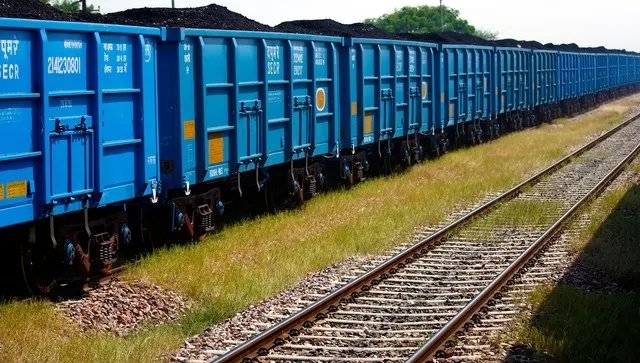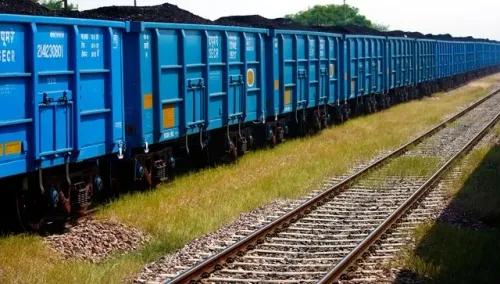Has Indian Railways Achieved 1 Billion Tonne Freight Loading in FY26?

Synopsis
Key Takeaways
- Indian Railways has crossed 1 billion tonnes in freight loading.
- Daily loading is at a strong 4.4 MT.
- Key contributors include coal and iron ore.
- New reforms aim to optimize cement logistics.
- Shifting to rail enhances sustainability and reduces carbon emissions.
New Delhi, Nov 22 (NationPress) The freight operations of Indian Railways are significantly bolstering India's economic foundation, as cumulative freight loading has surpassed the 1 billion tonne milestone, now standing at 1020 million tonnes (MT), as reported by the Ministry of Railways on Saturday.
This achievement showcases widespread support from essential sectors. Coal emerged as the primary contributor with 505 MT, followed by iron ore (115 MT), cement (92 MT), container traffic (59 MT), pig iron & finished steel (47 MT), fertilisers (42 MT), mineral oil (32 MT), foodgrains (30 MT), raw materials for steel plants (approximately 20 MT), and other goods (74 MT) as of November 19.
Daily freight loading remains robust at around 4.4 MT, which is an improvement from 4.2 MT last year, indicating enhanced operational efficiency and steady demand, according to the ministry.
The freight loading from April to October further emphasizes this upward trend, reaching 935.1 MT in 2025, compared to 906.9 MT during the same timeframe last year, reflecting a healthy year-on-year growth.
"This consistent momentum, alongside improved daily loading rates, illustrates the Railways' potential to facilitate India's industrial growth and infrastructure development," the ministry stated.
Understanding the vital role of cement in the nation's infrastructure advancement, the Railways has implemented crucial measures to optimize logistics in this area.
The recent introduction of comprehensive reforms, such as the Policy for Bulk Cement Terminals and rationalized rates for bulk cement transport in containers, signifies a strategic move towards modernizing cement logistics.
As per the statement, these initiatives aim to enhance bulk handling capacity, minimize transit time, and lower logistics costs, directly benefiting industry stakeholders and consumers alike while boosting efficiency throughout the supply chain.
Such focused interventions are pivotal in transforming the sector.
Transitioning bulk goods transportation to rail offers numerous advantages beyond mere commercial advantages. It lessens carbon footprints, alleviates highway congestion, and provides industries, including MSMEs, with access to more sustainable logistics options.
These advancements reinforce India's dedication to sustainable progress, aligning freight operations with the country's commitment to achieving Net Zero Carbon Emission targets and positioning the Railways as a key driver of both economic and environmental advancement, as noted by the ministry.









